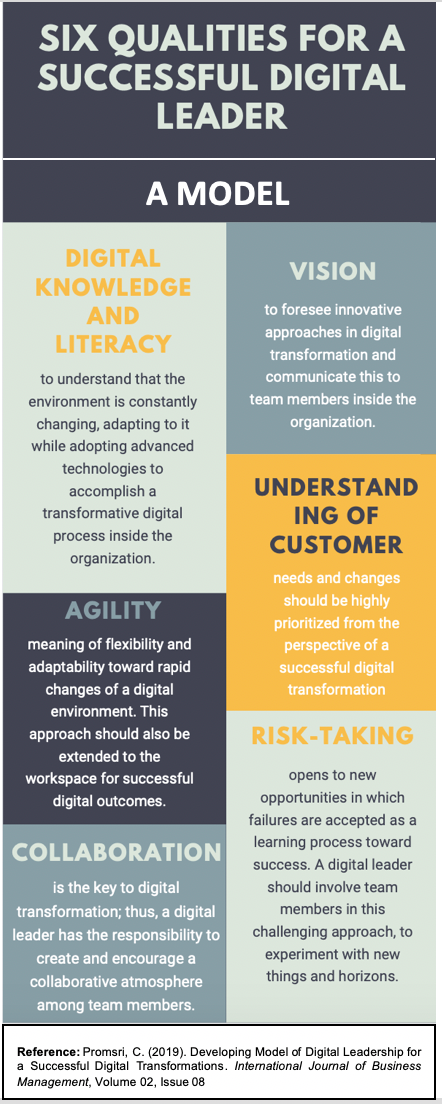
Facing Industry 4.0: Top Leadership Qualities To Digitally Transform
In this article, we cover Industry 4.0 and digital transformation while examining the “six characteristics of a digital leader for digital transformation success” and the four needed leadership skills to excel in Industry 4.0
"There is a difference between being a leader and being a boss. Both are based on authority. A boss demands blind obedience; a leader earns his authority through understanding and trust." (Klaus Balkenhol)
Continuing our series on leadership 4.0 and digital transformation, we shifted the focus on Industry 4.0 and digital transformation [1], novel roles and challenges that leaders need now to face to succeed in our 21st century. In this regard, a “4.0 leadership style matrix” [2] has been presented to investigate innovative leadership approaches to Industry 4.0. Furthermore, a novel culture that is cross-hierarchical, team-oriented, and cooperative in industry and organizations was suggested to prepare for disruption and digital transformation [3].
As previously mentioned, in today’s article, we will continue the discussion on Industry 4.0 and digital transformation mostly examining the “six characteristics of a digital leader for digital transformation success” [4] and the four needed leadership skills to excel in Industry 4.0 [5].
This article series aims to stimulate further research while improving training programs to educate future leaders 4.0.

A model for digital leadership: the six qualities
From investigating digital transformation and Industry 4.0 characteristics [1], to develop a novel matrix framework to define four 4.0 leadership styles [2], establishing a forward-looking, creative, and technologically advanced organizational culture [3], Promsiri (2019) proposed a model to define qualities for digital leaders [4]. Based on 12 sources and 11 websites, 64 qualities were found, analyzed with a congruence index criterion in which at least four qualities were needed to define a novel digital leader profile.
Results did show that six characteristics met the criterion and identified as the main qualities related to a digital leader for successful digital transformation:
- Digital knowledge and literacy to understand that the environment is constantly changing, adapting to it while adopting advanced technologies to accomplish a transformative digital process inside the organization;
- Vision to foresee innovative approaches in digital transformation and communicate this to team members inside the organization;
- Understanding of customer needs and changes should be highly prioritized from the perspective of a successful digital transformation;
- Agility meaning of flexibility and adaptability toward rapid changes of a digital environment. This approach should also be extended to the workspace for successful digital outcomes.
- Risk-taking opens to new opportunities in which failures are accepted as a learning process toward success. A digital leader should involve team members in this challenging approach to experiment with new things and horizons.
- Collaboration is the key to digital transformation; thus, a digital leader is responsible for creating and encouraging a collaborative atmosphere among team members.

Having identified these six qualities, a model called “Six Characteristics for Digital Transformation Success” was generated, a novel framework representing the starting point for further studies. However, the authors recognize a few limitations of this study, such as restricted research based on websites in which findings were based on document analysis, decreasing their trustworthiness. Nevertheless, this research may bring positive suggestions for developing innovative programs to enhance and further evolve these six leadership qualities for a successful digital transformation in workplaces and academia.
The four leadership skills need to face Industry 4.0
Facing Industry 4.0, leadership has to adapt to the changes; the guidance of teams and organizations toward impactful transformations demands strategic approaches to achieve innovative visions [6]. While supporting the transition toward Industry 4.0, responsive leadership [7] plays a unique role in promoting an organization's change in the perspective of a learning and innovation-oriented culture, adapting and managing different situations. However, leader 4.0 should not be confused with a technological leader; indeed, what makes a leader becoming 4.0 is not just the application of technologies but the ability to promote a novel culture focusing on people, technologies, and innovation while understanding how technologies would influence people and the organizations’ achievements [2]. As previously discussed, digital leadership is fast, cross-hierarchical, and team-oriented [2] toward successfully digitizing processes inside an organization and its business ecosystem. To overcome digital transformation challenges, a digital leader must actuate different business strategies and models, including IT functioning, more adaptive and responsive enterprise platforms, innovative mindset, skills, and workplaces [8]. Moreover, dealing with disruptive trends, constantly updated (e.g., AI, big data, IoT), leadership should fulfill a few characteristics: connected, responsive, collaborative, and network-experienced [7], and in which learning toward innovation is always promoted [9].
To embrace a digital environment, a few styles were proposed. A swarm leadership [7, 10], responsive to complex and agile systems, in which decision, innovation, and guidance come from a collaborative, self-organized, and network system. Furthermore, T. Petry [11] defined those digital leadership styles as suitable for the VUCA environment - volatility, uncertainty, complexity, ambiguity [12]. Among these: agile leadership (think differently, adapt to different situations, problem-solving), participative leadership (based on decentralization, collaboration, and sharing), network leadership (support internal and external networks), open leadership (open communication based on giving and receiving constructive feedbacks), and trust-based leadership (support team members and self-confidence).
More recently, based on the model proposed by Mumford, Campion, and Morgeson [13], Guzmán et al. (2020) [5] were aimed to identify which skills are needed to create a leadership 4.0 profile to develop future leaders in Industry 4.0. Four groups of skills were considered, and for each group, the main relevant skills were reported:
- Cognitive group: speaking, active listening, active learning, and critical thinking;
- Interpersonal leadership: negotiation, persuasion, and social perception;
- Strategic leadership: visioning, identification of key causes, system evaluation, and solution appraisal;
- Business leadership skills group: management of personnel resources, management of financial resources, management of material resources, and analysis skills.
These results represent a theoretical contribution to the research and development of leaders in Industry 4.0 and digital transformation while enabling and strengthening the adoption of the proposed set of skills into feasible applications. Indeed, a few factors and their relationship were identified and analyzed, in which the relevance of their relationship was also investigated and supported by the literature. Although limitations should be considered (e.g., the study did not consider challenges of industry 4.0 and associated leadership 4.0, the model of reference, or external validation from industries), more research would be needed to validate findings and extend novel horizons and results to improve the applicability of a leadership 4.0 profile toward successful digital transformation [5].
Empowering women toward leadership
In the following article of our series, a surprise topic will be waiting for you!
In the context of industry, digital transformation, and leadership, we will discuss the role of women in the leading position and their emancipation. This article will aim to empower, educate and support young women entering the world of Industry 4.0. while supporting, recognizing, and valuing the power of women. A few research studies will be discussed, from the understanding of gender differences in leadership [14] to proven gender different leadership scores [15] and gender preferences for leadership potential [16], different dominant styles in workplace environments [17] to finally citing lessons and advice from women in leadership positions [18]. A “neon pink” article entirely dedicated to strong, stubborn, and resilient women who aim to achieve high leading positions with grit, perseverance, and patience. Because WE CAN!
"There is a difference between being a leader and being a boss. Both are based on authority. A boss demands blind obedience; a leader earns his authority through understanding and trust." (Klaus Balkenhol)

References:
- BMBF-Internetredaktion (2016). “Zukunftsprojekt Industrie 4.0 – BMBF”. Bmbf.de. Available at: https://www.bmbf.de/de/zukunftsprojekt-industrie-4-0-848.html. [Accessed May 13, 2021].
- Oberer, B. & Erkollar, A. (2018). Leadership 4.0: Digital Leaders in the Age of Industry 4.0. International Journal of Organizational Leadership, 7, 4, 404-412. DOI: 10.33844/ijol.2018.60332
- Mouhamadou Sow & Solomon Aborbie (2018). Impact of Leadership on Digital Transformation. Business and Economic Research, Macrothink Institute, vol. 8(3), pages 139-148, September.
- Promsri, C. (2019). Developing Model of Digital Leadership for Successful Digital Transformations. International Journal of Business Management, Volume 02, Issue 08. DOI: HTTP://WWW.GPHJOURNAL.ORG/INDEX.PHP/BM Available at: http://gphjournal.org/index.php/bm/article/view/249/113
- Guzmán, V. E., Muschard, B., Gerolamno, M., Kohl, H., & Rozenfeld, H. (2020). Characteristics and Skills of Leadership in the Context of Industry 4.0. 17th Global Conference on Sustainable Manufacturing, Procedia Manufacturing, 43, 543-550.
- J. Kotter, What Leaders Really Do? Harvard Business Review (2001).
- R. Kelly, Constructing leadership 4.0. Swarm Leadership and the Fourth Industrial Revolution, Palgrave Macmillan, (2018).
- O. El Sawy, P. Kræmmergaard, H, Amsinck, A. Vinther, How LEGO built the foundations and enterprise capabilities for digital leadership. Mis Quarterly Executive, 15:2 (2016).
- S. Shamim, S. Cang, H.Yu1, Y. Li, Management Approaches for Industry 4.0, IEEE CEC (2016) 5309-5316.
- Princeton University "Swarm" WordNet. Princeton University. 2010.
- T. Petry, Digital leadership. In Knowledge Management in Digital Change, Springer, Cham, (2018) 209-218.
- N. Bennett, J. Lemoine, What Vuca really means for you, Harvard Business Review, 92 (2014).
- T. Mumford, M. Campion, F. Morgeson, The leadership skills strataplex: Leadership skill requirements across organizational levels, The Leadership Quarterly, 18 (2007) 154-166.
- Sule Alan, Seda Ertac, Elif Kubilay, Gyongyi Loranth, Understanding Gender Differences in Leadership, The Economic Journal, Volume 130, Issue 626, February 2020, Pages 263–289, https://doi.org/10.1093/ej/uez050
- Zenger, J. & Folkman, J. (2019). Research: Women Score Higher Than Men in Most Leadership Skills. Harvard Business Review. [Accessed on October 12, 2021]. Available at: https://hbr.org/2019/06/research-women-score-higher-than-men-in-most-leadership-skills
- Player A, Randsley de Moura G, Leite AC, Abrams D and Tresh F (2019) Overlooked Leadership Potential: The Preference for Leadership Potential in Job Candidates Who Are Men vs. Women. Front. Psychol. 10:755. doi: 10.3389/fpsyg.2019.00755
- Gipson AN, Pfaff DL, Mendelsohn DB, Catenacci LT, Burke WW. Women and Leadership: Selection, Development, Leadership Style, and Performance. The Journal of Applied Behavioral Science. 2017;53(1):32-65. doi:10.1177/0021886316687247
- Elias E. (2018). Lessons learned from women in leadership positions. Work (Reading, Mass.), 59(2), 175–181. https://doi.org/10.3233/WOR-172675

ExO Insight Newsletter
Join the newsletter to receive the latest updates in your inbox.









